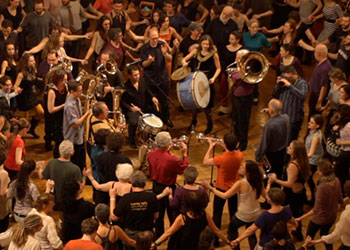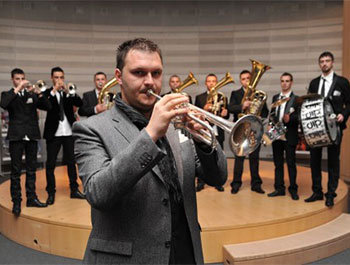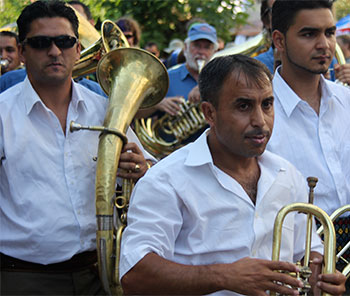THE STORY
A tiny Serbian village explodes with brass cacophony and riotous celebration as more than half a million music fans descend upon Guča, the world’s largest trumpet competition. Amidst a cast of defending Serbian champions and struggling Roma Gypsies, an unlikely brass band from New York City, Zlatne Uste, voyages to represent the United States only a decade after NATO bombs rocked Belgrade. They will be the first Americans ever to compete at Guča. Brasslands offers an intimate and sometimes unsettling portrait of how the hopes and fears of this diverse group of characters collide in their search for common ground and musical ecstasy.
The citizens of Guča prepare for the oncoming hordes with a mix of national pride and nervous energy. The older generation has lived through world war, socialist rule, national fragmentation, and ethnic cleansing – all of which has given way to a festival at the center of an evolving national identity. Middle-aged business owners hope to capitalize on a growing festival and huge influx of cash. The youngest watch the best trumpeters in the world play their country’s traditional music; some yearn to play on that stage, while others throw on their headphones to pump Metallica and Lady Gaga. In this war-scarred landscape, disparate societies find common ground in a joyous, deeply transcendent music that leaves no ear unaffected.
Every competitor seeks to win, but the film’s characters are all making their trumpet pilgrimages for very different reasons: 25-year-old “master trumpeter” Dejan Petrovic—the reigning Guča champion—returns to defend his championship title, while Demiran Ćerimović—a world-class Roma Gypsy trumpeter—struggles against deeply ingrained racism for the opportunity to make money for his family. Through it all, a fish-out-of-water American band plays to validate their very existence in front of a population still scarred by U.S. bombs.
As the festival commences, Brasslands bears witness to the deeper resonance of the music, as the town of Guča begins to swell with frenetic energy. From the deafening batteries of drums and staccato snares, to the euphoric brass chorales and electrifying trumpet solos, everyone here has gathered to celebrate the music, to dance, and to enjoy life. Despite the fact that tensions continue to simmer below the alcohol-fueled surface, Brasslands attests to the fact that even amidst fractured ethnic and political divides, there remains a universal human desire for identity, joy, and belonging—and that, if only for a few days, it will make itself heard.
Zlatne Uste Balkan Brass Band
Zlatne Uste (Golden Lips) is an internationally known group of American-born musicians playing traditional music of the Balkans, primarily representing Serbian, Macedonian, Bulgarian and Romany (Gypsy) traditions. Four-time invited guest at the Dragachevo Brass Festival in Guča, Serbia, the 12-piece band is among the foremost presenters of traditional Balkan dance music in the United States. Each year Zlatne Uste hosts and produces the Golden Festival, New York’s biggest and best Balkan music festival with an astounding 40 or more bands and something for everyone.
Dejan Petrović Band
Dejan Petrović hails from the town of Užice in western Serbia. He is the son of acclaimed brass musician Milovan “Mića“ Petrović, and is the fourth generation of brass musicians from this family, originally from the village of Duboko near Užice. Dejan was steeped in the regional brass style cultivated by his father’s band from his earliest years- he also imbibed Mića’s insistence on taking brass music seriously, rather than being a sporadic hobby, a philosophy that some credit with the success of his band and their ability to “match“ the dynamic southern Serbian, Romani competition. Dejan formed his first junior orchestra at the young age of 11. Within the next few years, he won the awards for “Best Orchestra“ and “First Trumpet“ in the junior band category at Guča. With the sudden passing of his father in 2000, Dejan was given leadership of his father’s orchestra. Since, he and his orchestra have won most of the major awards in Guča, including most “traditional“ style, “Best Orchestra,“ and “First Trumpet“ for Dejan in the senior band category. In 2006, he became the youngest brass musician to be awarded the title of “Master of the Trumpet.“ Dejan and his band prides themselves on nurturing the local western Serbian style of brass music, but also on successfully exploring other styles and more “modern“ genres of music that are increasingly popular both in Serbia and abroad.
Demiran Ćerimović Orchestra
“Vranjski Biseri” (Pearls of Vranje)
Demiran Ćerimović is an acclaimed Romani brass musician from the town of Vranje in southern Serbia. Through his father he comes from the Ćerimović clan in Vranje, many of whom are musicians and provide the bulk of brass musicians several local orchestras. Through his mother, however, he also has family roots in nearby Vranjska Banja, also well-known for large numbers of Romani musicians and a distinct musical style. Demiran’s band “Vranjski Biseri“ (“Pearls of Vranje“) has also included many musicians from neighboring Vranjska Banja and Pavlovac, allowing them to master the specific musical nuances of several local communities and thus enriching their band’s style—and bolstering demand for their services. Demiran’s orchestra was proclaimed “Best Orchestra” several times during prequalifying competitions in Surdulica, and three times during the final competitions in Gua in 2002, 2006, and 2007. His band was also at the peak of its popularity during that period, recording an album in 2005 (with Tonny Hanna) and 2006 (Pearls of Vranje) respectively. They have periodically toured abroad even as far as Beirut to perform for diverse audiences.










